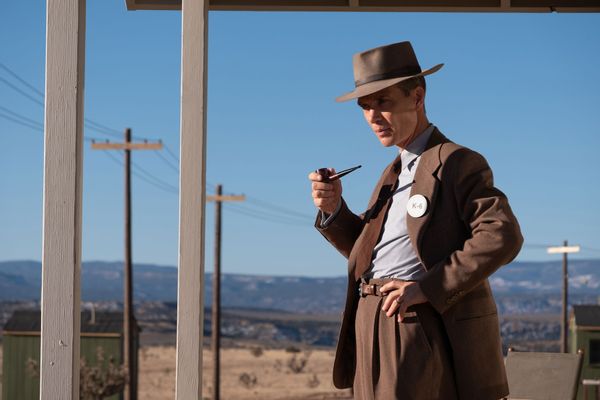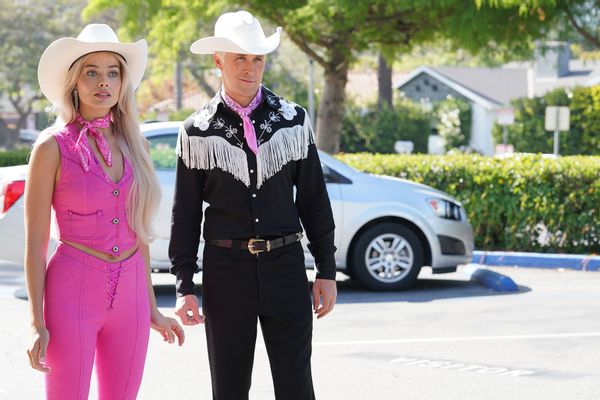In "Barbie," America Ferrera's character Gloria tells us that it's impossible to be a woman, while "Oppenheimer" demonstrates that the violence of patriarchy also makes it impossible to be a good man.
I'm so tired of men choosing violence, emotional and physical, of excusing the violence of other men, in order to stay in the boys club.
When faced with the consequences of their own actions, both Robert Oppenheimer (Cillian Murphy) and Barbie (Margot Robbie) seek to exercise strong leadership that is remorseful, accountable and rooted in feminist values of repair and community — but in Oppenheimer's patriarchy, as in the patriarchy of our real world, practicing feminist leadership is punished.
Recently, Warner Bros., perhaps inspired by the underlying message of "Barbie," apologized for tweets that made light of the nuclear bombings of Hiroshima and Nagasaki, just days before the anniversary of these events. This is a version of leadership that Oppenheimer was denied and that Barbie is able to enjoy: strength through accountability and repair.
When "Barbie begins," we see snippets of an idealized Barbieland. Lawyer Barbie stands up in court and says, "I have no difficulty holding both logic and feeling at the same time. And it does not diminish my powers, it expands them." On the other hand, as a successful man in a patriarchal nation, Oppenheimer was denied feelings. He couldn't unionize his workplace without consequences and he couldn't express remorse or regret about the use of the atomic bomb. As soon as he did, he was punished.
Our political leaders are similarly denied remorse. President Obama's visit to the Hiroshima Peace Memorial, which marked the first time a U.S. president had visited the site where nuclear bombs were first used in warfare, was derided as an apology tour.
"Barbie's' Gloria (Ferrera) is exasperated. "I'm just so tired of watching myself and every single other woman tie herself into knots so that people will like us," she said. I, too, am just so tired —of seeing men contort themselves to hide their best qualities: kindness, softness, joy, and care.
I am so tired of men choosing to be hard in order to not be seen as feminine. I'm so tired of men choosing violence, emotional and physical, of excusing the violence of other men, in order to stay in the boys club. I am so tired of the gender binary reinforcing patriarchy, and of patriarchy reinforcing the gender binary. I'm so tired of men attacking women and the queer community to prove themselves to other men. I'm so tired of "girl dads" being celebrated, rather than girl dad qualities being extended to children of all genders. We all lose when these are our societal norms.
 Oppenheimer (Universal Pictures)In both "Barbie" and "Oppenheimer," men perform masculinity for other men, preserving their egos by harming the women around them: in "Barbie, the Kens battle throughout the film, only working together when attacking what Barbie has built. Her dream house becomes Ken's Mojo Dojo Casa House, and the Barbies become subservient to the Kens. In "Oppenheimer," women are sexual fantasies, mothers-to-be or mothers. In both cases, as trophy wives or fantasies, for men to prove their worth to one another, for patriarchy to succeed, women must be the second sex and queerness must be isolated (Sorry, Allan).
Oppenheimer (Universal Pictures)In both "Barbie" and "Oppenheimer," men perform masculinity for other men, preserving their egos by harming the women around them: in "Barbie, the Kens battle throughout the film, only working together when attacking what Barbie has built. Her dream house becomes Ken's Mojo Dojo Casa House, and the Barbies become subservient to the Kens. In "Oppenheimer," women are sexual fantasies, mothers-to-be or mothers. In both cases, as trophy wives or fantasies, for men to prove their worth to one another, for patriarchy to succeed, women must be the second sex and queerness must be isolated (Sorry, Allan).
What would have happened if Oppenheimer lived in Barbieland – a world, Will Ferrell tells us, without real weapons? What could he have created, what world would we live in today, if he had been able to hold feelings and logic, and the U.S. had never developed or dropped the atomic bomb?
We need your help to stay independent
In "Oppenheimer," when the rules break down and he begins to question the scale of violence that the state is pursuing, he is punished. In "Barbie," when the rules break down and her heels hit the floor, her community surrounds her with care and concern. She is encouraged to seek out the root causes of her unease. And, in the real world, she is confronted with the consequences of her life: that she has been complicit in creating impossible standards for women, and that the Kens have been taken for granted.
Patriarchy, as we see in the film, punishes dissent so effectively that we are afraid of dissenting at all.
In "Oppenheimer," the only accountability he faces is damage to his career, his ego and his sense of self. He is never accountable to communities most harmed by his work. He imagines the damage of the bomb, but unlike Barbie, he is never confronted with the communities he has hurt, the lives destroyed by his creation. Even at the end of the movie, as he fears the world has been set on fire, he never has to experience loss like the citizens of Hiroshima and Nagasaki, or downwinders, Indigenous communities and uranium miners across the southwest U.S. have.
The day I saw "Oppenheimer," I also watched a Congressional hearing on Afghanistan. Like "Oppenheimer," the hearing had no testimony from communities directly impacted by U.S. militarism. We continue to repeat our history because we have failed to practice accountability, listen to dissent and address harm with community, care and a commitment to repair. And part of why we have not learned these lessons is because patriarchy, as we see in the film, punishes dissent so effectively that we are afraid of dissenting at all. Just look at how Ken is scared of dissenting until he is introduced to patriarchy. Neither the Kens nor Los Alamos' scientists can break ranks without punishment.
 Barbie (Warner Bros.)Unlike Oppenheimer, Barbie is directly confronted with the harms of promoting an idealized feminine image and, through Gloria, is reimagined as an ordinary Barbie celebrating a life renewed through the promise of equality. She is confronted with the impact of taking Ken for granted: instead of seeking equality, the Kens enact revenge, trashing Barbieland and taking steps to consolidate their power. When the Barbies come back to restore Barbieland, almost miraculously, Barbie apologizes. She knows she has taken Ken for granted, and the other Barbies also realize that the weight of unyielding leadership has become too heavy. It's both a burden and an opportunity; one that they want to share.
Barbie (Warner Bros.)Unlike Oppenheimer, Barbie is directly confronted with the harms of promoting an idealized feminine image and, through Gloria, is reimagined as an ordinary Barbie celebrating a life renewed through the promise of equality. She is confronted with the impact of taking Ken for granted: instead of seeking equality, the Kens enact revenge, trashing Barbieland and taking steps to consolidate their power. When the Barbies come back to restore Barbieland, almost miraculously, Barbie apologizes. She knows she has taken Ken for granted, and the other Barbies also realize that the weight of unyielding leadership has become too heavy. It's both a burden and an opportunity; one that they want to share.
"Barbie's" matriarchy is imperfect, but that is the point: it is capable of evolution, and the movie follows not just Barbie's journey, but the journey of Barbieland as it adapts to new challenges. Barbieland's challenges are flat feet, the revolution of the Kens, and adopting variations of Barbie with existential crises. Our challenges in the real world are many: climate crisis, endless militarism and a patriarchal, homophobic and racist state. "Barbie" shows us it is possible to adapt to meet those challenges. We can prioritize abundant life, instead of violence and power. We can follow Barbie's lead and work with Allan to enact queer liberation. We can build a society based on accountability and care.
If we imbue feminist values into our politics and our culture, our institutions and how we treat one another, we can uproot patriarchy and embrace abundant care for one another. And maybe then, we can have more dance parties and fewer nukes.



Shares